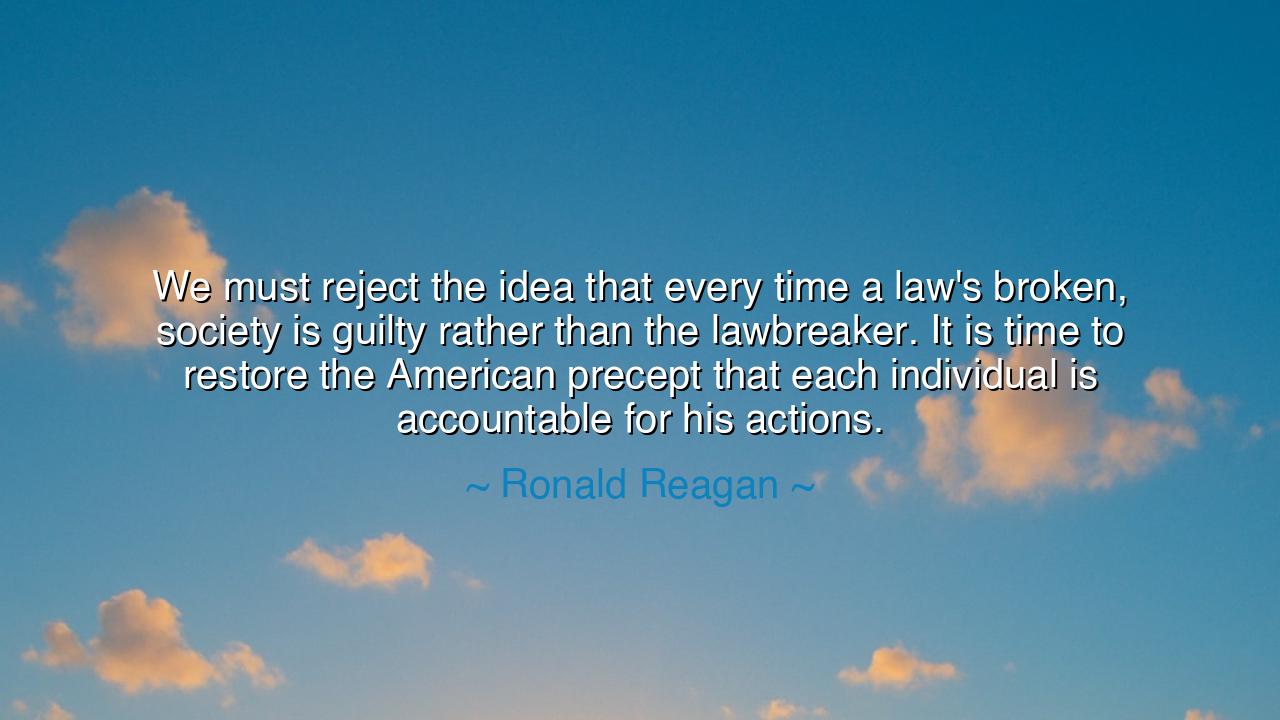
We must reject the idea that every time a law's broken, society
We must reject the idea that every time a law's broken, society is guilty rather than the lawbreaker. It is time to restore the American precept that each individual is accountable for his actions.






In the great tapestry of human society, where laws and moral codes form the framework of justice and order, there arises a profound question: to whom do we attribute responsibility when a law is broken? In the words of Ronald Reagan, “We must reject the idea that every time a law's broken, society is guilty rather than the lawbreaker. It is time to restore the American precept that each individual is accountable for his actions.” These words, spoken with the wisdom of a leader who understood the delicate balance between freedom and order, remind us of the foundational principle of justice—that individuals must be held accountable for their actions, and that society cannot bear the blame for the choices made by each person.
To understand the weight of this statement, we must first reflect on the role of accountability in any healthy society. From the dawn of civilization, justice has rested on the idea that every person is responsible for their own actions. The Code of Hammurabi, one of the earliest sets of laws, emphasized this principle by establishing consequences for those who broke the law, regardless of their station in life. In the ancient Greek concept of democracy, individuals were encouraged to make ethical decisions, and their responsibility was not only a civic duty but a moral one. In these societies, the balance between collective well-being and individual accountability was paramount.
However, as societies grow and evolve, the lines between personal responsibility and collective guilt can blur. Reagan’s words are a warning about the dangerous tendency to shift the blame for criminal acts from the individual to the society itself. When society is held accountable for the misdeeds of its members, we risk diluting the concept of personal responsibility, leading to a culture of excuses and a weakening of moral clarity. This shift can have devastating consequences, for it places the burden of guilt on an entire population rather than on the individual who has transgressed. Accountability is the bedrock of justice, and to undermine it is to invite chaos into the system.
In ancient Rome, the Roman Republic was built upon the idea of individual accountability. Citizens were expected to act with integrity, and the legal system held them to the highest standards of responsibility. When someone violated the law, it was not the state that was blamed but the individual who had broken the social contract. The fall of Rome, however, was marked by a gradual erosion of personal responsibility and an increasing reliance on bureaucratic structures to deal with crime. The lack of personal accountability contributed to the weakening of Roman society, as individuals increasingly saw themselves as mere pawns in a larger political machine, no longer responsible for their own actions.
Consider the rise of modern-day welfare states, where the collective responsibility for social well-being can sometimes obscure individual accountability. When society is tasked with taking care of every individual’s needs, there arises the question of how much the individual is expected to contribute to their own well-being. The danger in this is not in helping those in need, but in fostering a culture where individuals avoid taking responsibility for their own choices. Reagan’s warning was not an attack on compassion, but a reminder that true freedom can only exist when individuals are held to account for their decisions, actions, and consequences.
The lesson to be learned here is profound and urgent: we must return to the principle of personal accountability, not just in law, but in all aspects of life. Society cannot flourish when individuals refuse to take responsibility for their own choices. We must recognize that, while society has a role in fostering a just and equitable environment, it is ultimately the individual who must face the consequences of their own actions. The safety and strength of a nation lie in the collective moral integrity of its people, and this integrity can only be preserved if each person stands accountable for the choices they make.
Thus, the practical action we must take is simple yet profound. We must encourage a culture of responsibility, where individuals are taught from an early age to recognize the impact of their actions on the world around them. Justice is not merely a set of laws to be obeyed, but a system that demands each person to live with integrity and honor. When we, as a society, hold ourselves and others accountable for our choices, we strengthen the very foundation of freedom and justice. This is the lesson that Reagan’s words impart upon us: that to build a just society, we must not pass the blame onto others, but hold each individual responsible for their own actions, and in doing so, we restore the strength of our shared values.






AAdministratorAdministrator
Welcome, honored guests. Please leave a comment, we will respond soon